
The Secret Places XXI & XXII
Continue reading



 The penultimate two chapters of The Secret Places (Elkin Mathews & Marrot London 1929) - a chronicle of the 'pilgrimages' of the author, Reginald Francis Foster (1896-1975), and his friend 'Longshanks' idly rambling in Sussex, Kent and Surrey. See our posting of the first chapters for more on Foster and this book, including a contemporary review in
The penultimate two chapters of The Secret Places (Elkin Mathews & Marrot London 1929) - a chronicle of the 'pilgrimages' of the author, Reginald Francis Foster (1896-1975), and his friend 'Longshanks' idly rambling in Sussex, Kent and Surrey. See our posting of the first chapters for more on Foster and this book, including a contemporary review in
The Tablet.

Two more chapters of The Secret Places (Elkin Mathews & Marrot London 1929) - a chronicle of the 'pilgrimages' of the author, Reginald Francis Foster (1896-1975), and his friend 'Longshanks' idly rambling in Sussex, Kent and Surrey. See our posting of the first chapters for more on Foster and this book, including a contemporary review in The Tablet.
Continue reading
Two more chapters of The Secret Places (Elkin Mathews & Marrot London 1929) - a chronicle of the 'pilgrimages' of the author, Reginald Francis Foster (1896-1975), and his friend 'Longshanks' idly rambling in Sussex, Kent and Surrey. See our posting of the first chapters for more on Foster and this book, including a contemporary review in The Tablet.
Continue reading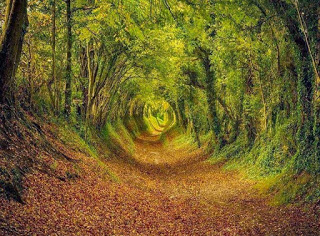
Two more chapters of The Secret Places (Elkin Mathews & Marrot London 1929) - a chronicle of the 'pilgrimages' of the author, Reginald Francis Foster (1896-1975), and his friend 'Longshanks' idly rambling in Sussex, Kent and Surrey. See our posting of the first chapters for more on Foster and this book, including a contemporary review in The Tablet.
Continue reading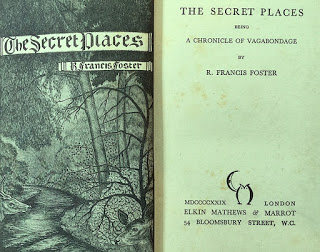
Two more chapters of The Secret Places (Elkin Mathews & Marrot London 1929) - a chronicle of the 'pilgrimages' of the author, Reginald Francis Foster (1896-1975), and his friend 'Longshanks' idly rambling in Sussex, Kent and Surrey. See our posting of the first chapters for more on Foster and this book, including a contemporary review in The Tablet.
XI
THE FRIARY IN THE HILLS
It chanced that I had to go over into Surrey hm Sussex to pay a visit to the Franciscan Friary whence we had started on our wanderings. Leaving Longshanks, therefore, in an inn at Chidding in the fold country, whither we had gone in search of a man who claimed to be a direct descendant of Earl Godwin–though what he was doing here in the south I do not know–I went through the gap in the hills to Guildford and, being weary, took a ‘bus thence to Chilworth.
Because I was stupid with sleep I left that ‘bus at the wrong place, and, being unfamiliar with the country west of the Friary, I sought direction from a butcher and a queer man who carried a lighted lantern, though it was yet mid-afternoon. Thereafter I walked two miles, as I had been told, I came at last to a large crucifix by the roadside and entered the Friary grounds.
Continue reading

Two more chapters of The Secret Places (Elkin Mathews & Marrot London 1929) - a chronicle of the 'pilgrimages' of the author, Reginald Francis Foster (1896-1975), and his friend 'Longshanks' idly rambling in Sussex, Kent and Surrey. See our posting of the first chapters for more on Foster and this book, including a contemporary review in The Tablet.
IX
MY LADY OF THE MIST
To tell of the incidents of every day of our wanderings would be monotonous and wearisome, and so I make no effort to do so. Moreover, what is of interest, or gives happiness, to Longshanks and myself is not necessarily entertaining to anyone else. And because we had no aim but aimlessness–which is good for men sometimes–we wandered from county to county as the spirit moved us, having no regard for even a daily itinerary or for a settled account when our adventures should be written down.
It was at Small Dole–which is in Sussex–that we discussed, the relative merits of hot and cold shoeing with the big blacksmith, and when we had worked him to a passion of rage at our obstinacy, so that he stuck out his big fan of a beard at us and cursed us with a strange oath, we were minded to continue our journey to the Downs. It was not long after dawn, and October rime still lay where the sun had not yet thawed it.
Continue reading
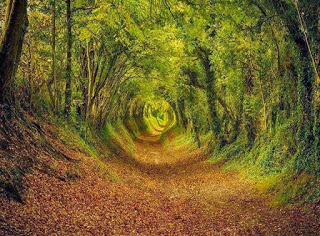
Two more chapters of The Secret Places (Elkin Mathews & Marrot London 1929) - a chronicle of the 'pilgrimages' of the author, Reginald Francis Foster (1896-1975), and his friend 'Longshanks' in Sussex, Kent and Surrey. See our posting of the first chapters for more on Foster and this book, including a contemporary review in The Tablet.
THE WOOD OF MYSTERY
Leatherhead used to be famous for its "nappy" ale, as King Henry the Eighth's laureate knew, for he wrote a song about the mistress of the Running Horse Inn and praised the brew, as a man should. And the Mole, which chatters its way half round the town, was famous for its trout. Alas! in these days the ale there is no better than it should be, and of trout there are none–at least Longshanks and I were not served with any.
But Leatherhead has its distinction even now, and you shall mark it whether you proceed thither by train, by car, or on foot. For at Leatherhead the rather threadbare rusticity of the country south of London ends, and when you have climbed the steep hill beyond the bridge on the Guildford road you are in a new land. In the little rectangle of which one side is the main road between Leatherhead and Dorking, and the opposite side an imaginary line running through Little Bookham and Effingham and ending roughly five miles due ; west of Dorking, you may get lost an hundred times.
I scruple to say how this may be done, for when a horde of people get lost together there is no mystery nor any fear; only paper bags and bottles left on the eternal hills and in the secret places of the woodland. And so I shall be vague.
Continue reading
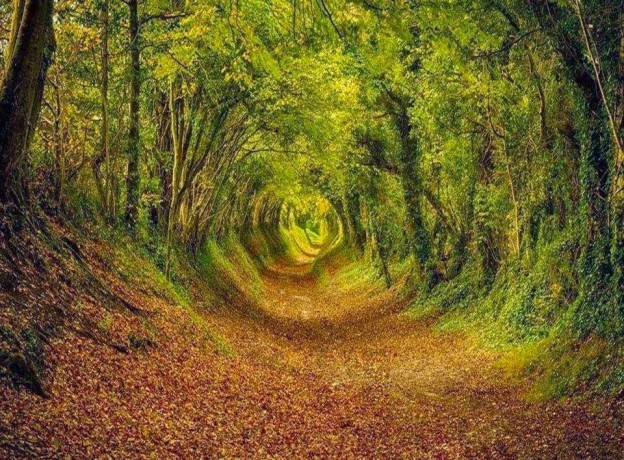
Two more chapters of The Secret Places (Elkin Mathews & Marrot London 1929) - a chronicle of the 'pilgrimages' of the author, Reginald Francis Foster (1896-1975), and his friend 'Longshanks' in Sussex, Kent and Surrey. See our posting of the first chapters for more on Foster and this book.
Continue reading
Two more chapters of The Secret Places (Elkin Mathews & Marrot London 1929) - a chronicle of the 'pilgrimages' of the author, Reginald Francis Foster (1896-1975), and his friend 'Longshanks' in Sussex, Kent and Surrey. See our posting of the first chapters for more on Foster and this book..
Continue reading
 |
| Ashdown Forest* |
These are the first two chapter of The Secret Places (Elkin Mathews & Marrot London 1929) - a chronicle of the 'pilgrimages' of the author, Reginald Francis Foster (1896-1975), and his friend 'Longshanks' in Sussex, Kent and Surrey. One of those magical walking/ rambling books that appeared in the 1920s and 1930s while, to quote Waugh, 'the going was good' despite ribbon development and the ubiquitous motor car. It was probably aimed at urban and suburban dwellers who got away to the country at weekends or when they could. Foster was a jobbing journalist who also wrote books on the countryside and how-to-write books. Most of this book had appeared in the Evening News in the late 1920s. He also wrote detective fiction. Between 1924 and 1936, according to Hubin, he produced 11 mysteries, some featuring a detective called Anthony Ravenhill (The Dark Night, The Missing Gates, The Moat House Murder etc.,) This contemporary review of The Secret Places in The Tablet gives a flavour of the work. There follows the first two chapters…(more to come)
We like The Secret Places. Mr. R. Francis Foster knows where treasure lies hid, and would gladly share his secret with those worthy of the trust. But he fears the barbarian motorist, "with soul so dead" that he is to be stirred only by speed records until the love of country cannot touch him. Therefore he compromises by describing byways where the demon speed cannot go : quiet, ancient ways to be trodden only by the feet of the humble pilgrim in quest of peace and beauty. The author himself trod these paths with a fitting companion, setting out in the autumn along the Pilgrims' Way and wandering through the counties of Surrey, Sussex and Kent until Spring, bringing alas, a plague of cars in her train, drove the travellers from the roads ! Then they ended their journey at Chilworth Friary, where it had begun, convinced that cars are a curse of the devil, and that "the limit in permissible inventions should be the bicycle, foot propelled." This little volume, although perhaps rather self-conscious in the writing, will please lovers of the English countryside and leave them with many delightful things 'pleasant to think on.' We should like to know more of Zebedee, the Zebra, a strange gift-horse to the pilgrims whose fate, after his total disappearance by night, they never seem to have found out.
Continue reading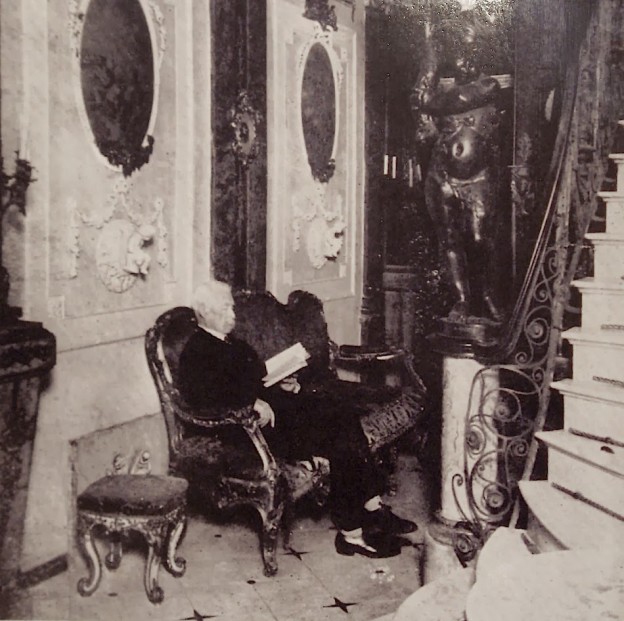
 |
| Frankfort-Moore in his Italian Home |
From A Mixed Grill : a Medley in Retrospect / by the author of "A Garden of Peace". London : Hutchinson, [1930.] The anonymous author was, in fact, Frank Frankfort Moore (1855–1931) an Irish dramatist, biographer, novelist and poet. Born in Limerick, Ireland, Moore worked as a journalist (1876–92) before gaining fame as an author of fiction. The frontispiece of this book shows him in his 'Italian Home' - this was actually a house in St. Leonards called 'The Campanile' filled with Italian artefacts that was on sale in 2010. On the subject of ghosts he is somewhat sceptical but most subjects, as the title implies, are seen from a slightly gastronomic viewpoint:
All the great ghost-seers on record have been also eminent dyspeptics - men and women who were deficient in pep or who had ruined their digestions by irregularity in diet or by a wrong diet. The ghost is really a symptom and it is rightly so regarded by the medical profession. We all know the sort of person who is associated with a ghost story - the ethereal girl like the sister of Sir Galahad who saw the Holy Grail - "I thought she might have risen and floated" - that girl has really risen and floated in innumerable ghost stories - the type of girl on whom that form of rash, known as the stigmata, has from time to time appeared. This may be the ghost of indulgence. In the days of gluttons there was a glut of ghosts, and there are few men of middle age to-day who have not had some experience of the man whose ghosts take the questionable shape of blue monkeys pr black cats, sometimes even of such minor crawling things as spiders or black beetles in natural colours, or, more frequently, snakes of no recognised classification. These are all the result of an over indulgence in the drug known as alcohol. Other drugs such as opium or cloral are productive of more pleasing spectral shapes; but this class of ghost has nothing in common with the phenomena of Spiritualism. Their capacity of self-expression does not go beyond the ordinary gibber. They are not worthy of serious consideration, except, of course, from the standpoint of a medical prognosis.
A humble variant is, of course, the nightmare, a horror due to such a ridiculous accident as a slipped pillow or a superfluous eiderdown, but more frequently to an incautious or a too hasty supper...